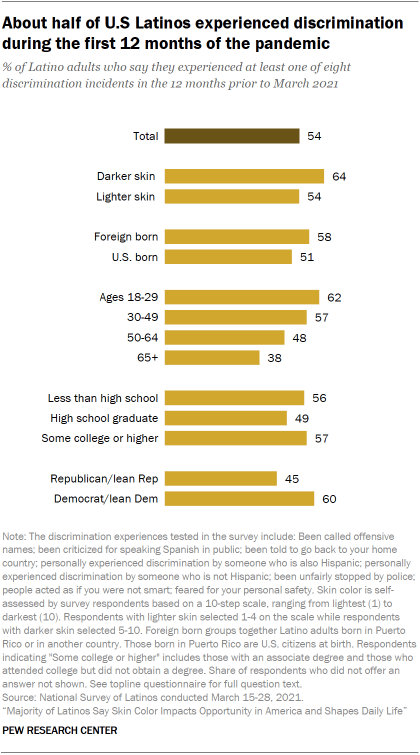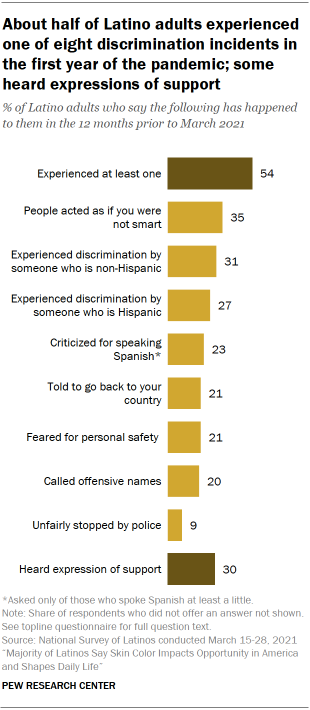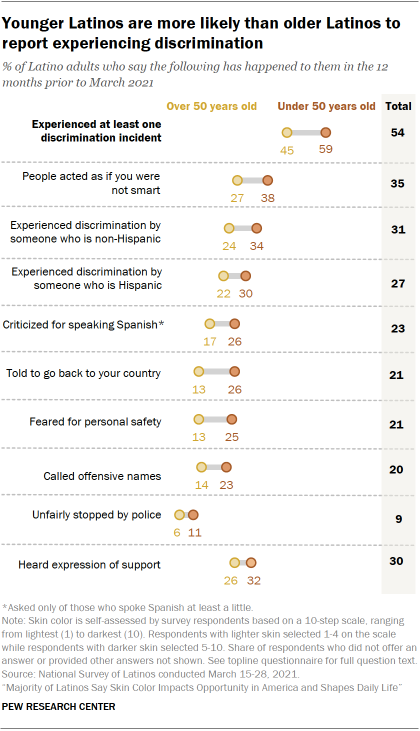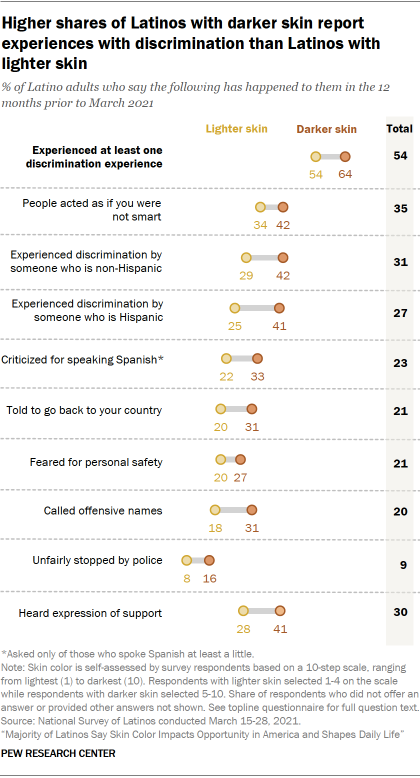During the first 12 months of the COVID-19 pandemic, more than half (54%) of Latinos say they experienced at least one of eight specific forms of discrimination, according to the March 2021 survey of Latino adults. However, experiences with discrimination vary notably by skin color, age and partisanship.
In the national survey, respondents were asked whether or not they have been called offensive names because they are Hispanic; been criticized for speaking Spanish in public; heard a remark from someone that they should go back to their home country; personally experienced discrimination or been treated unfairly because of their background, by someone who is Hispanic and by someone who is not Hispanic; been unfairly stopped by police; people acted as if they thought they were not smart; and feared for their personal safety. Survey respondents were also asked if someone expressed support for them because they are Hispanic. (This is not an exhaustive list of possible discrimination experiences. Some Hispanics who said “no” to all these may still have experienced some form of discrimination not captured by the survey. Meanwhile, some respondents might have experienced more than one type of discrimination reported here.)
Experience with discrimination in the year prior to the survey is linked to skin color. Nearly two-thirds (64%) of Latinos with darker skin say they experienced at least one of the eight discrimination events compared with 54% of Latinos with lighter skin. Even so, at least half of each group experienced some form of discrimination in the first year of the pandemic.
Other demographic characteristics are also linked with discrimination experiences. Latinos under 50 were more likely to report experiencing discrimination than Latinos over 50. Roughly six-in-ten Latinos ages 18 to 29 (62%) and 30 to 49 (57%) experienced at least one form of discrimination in the 12 months prior to the survey. By comparison, roughly half (48%) of Latinos ages 50 to 64 experienced discrimination, and about four-in-ten Latinos (38%) ages 65 and older experienced discrimination.
Additionally, six-in-ten Hispanic Democrats (60%) experienced discrimination, compared with 45% of Hispanic Republicans who say the same.
Hispanics experienced discrimination from non-Hispanics and Hispanics alike
Among the eight discrimination experiences asked about in the survey, the most common experience reported by Latino adults was people acting as if they are not smart. More than one-third of Latinos (35%) say this happened to them in the 12 months prior to the survey. Latinos who are bilingual are more likely to say they’ve been treated this way (41%) than those who are dominant Spanish speakers (32%) and those who are dominant English speakers (29%).
The second most common discrimination experiences were those coming from other people. But notably, Hispanics say they personally experience discrimination from Hispanics and non-Hispanics alike. About three-in-ten Hispanics (31%) say they personally experienced discrimination or were treated unfairly because of their Hispanic background by someone who is not Hispanic, while some 27% say they personally experienced discrimination or were treated unfairly by someone who is Hispanic.
However, this gap is wider for some Latino demographic subgroups than others. For example, among Latinos with college experience, 35% say they experienced discrimination by someone who is not Hispanic, while 26% say they experienced discrimination by someone who is Hispanic – a 9 percentage point gap. By comparison, among Latinos with less than a high school diploma, 28% experienced discrimination by someone who is not Hispanic, while 32% say they experienced discrimination by someone who is Hispanic – a 4-point gap in the other direction.
Among other discrimination experiences tested in the survey, about one-in-five Hispanics say they were told to go back to their home country (21%), were criticized for speaking Spanish in public (23%) or were called offensive names (20%). All three of these are little changed from a 2019 survey of Hispanic adults conducted before the pandemic. The current survey also found that 21% say they feared for their personal safety and that 9% say they were unfairly stopped by the police.
Despite these experiences with discrimination, three-in-ten Latinos say someone expressed support for them because of their Latino background, a finding that remains unchanged from 2019, when 30% said the same.
Latinos with darker skin experience more discrimination than Latinos with lighter skin
Skin color is connected to discrimination experiences for Latinos, according to the survey. While 54% of Latinos with lighter skin experienced at least one of the eight incidents measured in this survey, nearly two-thirds (64%) of Latinos with darker skin experienced the same.
This gap in experiences by skin color extends across all discrimination experiences asked about in the survey. For example, while about three-in-ten of Hispanics with lighter skin color (29%) personally experienced discrimination because of their background from someone who is not Hispanic, 42% of Hispanics with darker skin color personally experienced the same. Similarly, a quarter (25%) of Hispanics with lighter skin color report personally experiencing discrimination by someone who is also Hispanic, while 41% of Hispanics with darker skin color report experiencing the same.
Although Latinos with darker skin are more likely than Latinos with lighter skin to experience each of the eight incidents, they are also more likely than Latinos with lighter skin color to say someone expressed support for them. Some 41% of Latinos with darker skin say they have heard expressions of support in the year prior to the survey, while 28% of Latinos with lighter skin say they heard the same.
Experiences with discrimination are more common among younger Latinos
Younger Latinos are more likely to say they experienced discrimination than older Latinos, according to the survey. For each of the eight measures of discrimination, Latinos under 50 are more likely than Latinos who are 50 and older to say these things happened to them. For some of the measures there is a gradual decrease as age increases. For example, about four-in-ten Latinos ages 18 to 29 (40%) and 30 to 49 (38%) say people acted as if they were not smart. This share drops to 31% for Latinos ages 50 to 64, while only 19% of Latinos 65 and older say people acted as if they were not smart.
Part of the reason for the difference in experiences may be related to skin color. Younger Hispanics are more likely to say they have darker skin than older Hispanics. Some 18% of Hispanics ages 18 to 29 and 17% of those ages 30 to 49 indicate they have darker skin. By comparison, 11% of Hispanics ages 50 to 64 and 10% of Hispanics 65 and older indicate the same about their skin color. Yet, even controlling for skin color, younger Hispanics are still more likely to report one of the eight discrimination experiences happened to them in the 12 months prior to the survey than older Hispanics.






